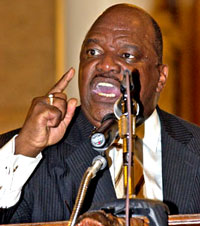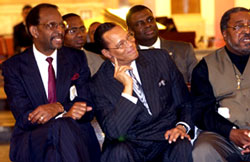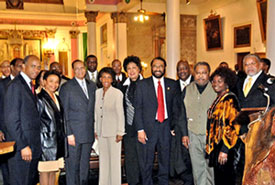
NEW ORLEANS (FinalCall.com) – “What is it going to take for us to participate in this rebuilding process when they stop writing about it and when the cameras stop flashing? What are you willing to give up for New Orleans? What are you willing to give up for the Ninth Ward? How are you willing to invest yourself in the restoration of this town?” asked Dr. Major Jemison, president of the Progressive National Baptist Convention, during his sermon for the Martin Luther King Jr. Ecumenical Right of Return Service Jan. 13.
More than fitting for the occasion, his exuberant delivery was reminiscent of the oratory firepower of the legendary civil rights leader. “We have to still come to the table just as committed,” he answered. “It is still our responsibility to prod the country.”
Dr. Jemison said Nehemiah 4:6 “captures the task that lays before us as we look at the devastation and then work towards doing something in the redemptive life of this city.” He explained that just as Nehemiah was found on his knees, asking God for help in rebuilding the walls of Jerusalem, so must we be found on our knees.
“If we are going to stand this community up again, we must first put this community on its knees. Nehemiah said it would take a sacrificial spirit that submerges us into something that we are uncomfortable doing. Sacrifice says that there are areas in our lives that we have to give up,” he said. “Coming back here means we have to sacrifice time, talent and resources and we have to do it when the cameras are turned off. We don’t need fanfare; we need a sacrificial spirit.”
Held in the heart of the Treme area, an historically Black neighborhood, the service was hosted by Reverend Jerome LeDoux at the St. Augustine Catholic Church, the oldest Catholic church in the city. Remarks by ministers across the Christian spectrum, city officials, activists and members of the Congressional Black Caucus (CBC) were interspersed with prayers and hymns. From the opening hymn of “This is the day that the Lord has made” to the concluding address by the Honorable Minister Louis Farrakhan, the service unapologetically presented every person sitting in the audience with their responsibility to help solve the problems facing Black people displaced from New Orleans in their efforts to restore their lives.

“Oh God, you have ignited the sparks within us into a blazing demand for freedom, equality and justice. This quest cost Harriet Tubman sleepless nights, as she led her people to freedom; it was an equality that Rosa Parks and civil rights activists fought for and gave their lives for; it was a justice that Martin Luther King Jr. stood for, as thousands stood with him at the Lincoln Memorial,” Reverend Lois DeJean, of Ebenezer Baptist Church, said during the liturgical reading.
And the congregation answered at the conclusion of the reading, “Lest our hearts drunk with the wine of the world we forget Thee. Shadowed beneath Thy hand, may we forever stand. True to our God and true to our native land.”
After the hymn “Trust in the Lord,” Kevin Stephens, director of the city’s health department, echoed that sentiment, beginning his remarks by saying, “We have to trust in no other than our Lord God. Don’t trust in me, and Lord knows we can’t trust in FEMA.”
He shared his vision for the rebuilding process to include a better healthcare system, where “people will not have to choose between getting medication or paying their light bill” because more funds will be allocated to improve access to health care and health education.
“Once again, history has proven to us that it is not bullets and bombs that has been the most destructive to society,” he noted, “but it has been disease and disaster.”
Ron Daniels, president of the Institute of the Black World in the 21st Century, reminded the audience that the fight of Dr. King against social injustice encompasses the fight of the poor people displaced from Hurricane Katrina.
“This is a time to raise up what King would be talking about if he was with us. He would say, ‘We in this nation have continually come to America with a promissory note that is supposed to guarantee quality of life, but Katrina exposed that the check still comes back insufficient funds for the poor.’ We are here to say to America and ourselves that that promissory note is going to be cashed and we are going to make a huge down payment right here in New Orleans,” he insisted, “because we are drawing the line in the sand and say we will not be deterred and turned around.”
After a charity offering was collected to be donated to the children that have remained under the supervision of the president of the New Orleans school board, the audience listened to two scriptural readings.
Mtangulizi Sanyika, executive director of the African American Leadership Project and coordinator of the conference’s events, read from the Old Testament, Nehemiah 2:1-18, which speaks of the rebuilding of the temple in Jerusalem. “How long would my journey take and when will I return?” he read. “Do you see the evil plight in which we are standing, the gates of Jerusalem? Come, come, let us rebuild the walls of Jerusalem so that we may no longer be an object of derision. Let us be up and rebuild; and they undertook the good work with vigor.”

Coming straight from the congressional field hearing held that afternoon, members of the Congressional Black Caucus remained in the city to address the audience, although they were supposed to leave immediately after the hearing to head to Mississippi for a hearing scheduled the following day.
Congresswoman Maxine Waters shared, to no surprise, that they have been working “uphill” against the Bush administration, which is “trying to make everyone believe that we cannot afford to do what is needed to be done,” but “is spending a billion dollars a week in Iraq.”
While acknowledging that the CBC must work diligently to repeal the damage already done, she implored people to help by any means necessary to keep the issues on top of the agenda. “People are going to have to get up and move,” she insisted, “and put on the street heat that is necessary to move Congress who do not intend to do it.”
She concluded, “We are with you and we must work together in order to bring about justice, equality and fairness for the people who are being denied, undermined and marginalized in a very sophisticated way.”
Following the inspiring remarks by Rep. Waters, Pastor Leon Thompson offered a prayer of recommitment, asking the audience to recommitment at every level of our lives as well as to remember everyone in this nation who are trying to make their way home.
The theme of finding the way home rooted the concluding address delivered by Minister Farrakhan, who referenced the Biblical parable of the prodigal son. However, in his masterful teaching, he compared the parable not simply to the plight of our displaced people scattered throughout 44 states, but to the condition of all Black people in this country trying to gain acceptance by the rulers of the land.
“The prodigal son went among a strange land with a strange people, trying to join on. Your problem is that you are not now, nor have you ever been, a citizen of the United States of America. You are enslaved,” he said. “I know this hurts. It bothers me to hear you crying about how you are an American but they treat you like a slave. It bothers me that you are willing to fight and for a government that is not willing to sacrifice anything for you.”
Because President George Bush is trying to balance the budget on the backs of the poor, Minister Farrakhan further contended that New Orleans would never be rebuilt if it depends on the greed of the bloodsuckers of the poor.
Minister Farrakhan explained that the prodigal son’s job of feeding the swine and husking corn meant that he was feeding the filthy appetites of the people. The fornication, adultery, filth and foolishness that is rampant in America is concentrated in the freakish social order and events in New Orleans, he added.
“New Orleans, you are the microcosm of the macrocosm. You are literally like a sample of blood that can tell the sickness of a human being. You are like the sampling of the disease that is a part of the pathology of our people,” he said. “We stink in the nostrils of God.”
Because of pervasive decadence, God visited New Orleans, he added, in order to force us to reform ourselves.
He concluded, asking, “Are you willing to hear from the wind and get your act together? Are you going to feed swine and husk corn or are you going to rise and go to your Father?”












